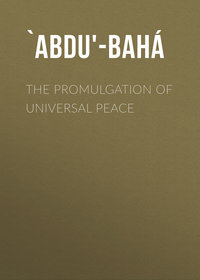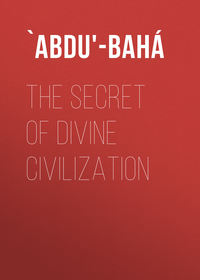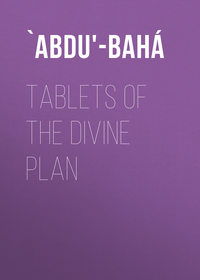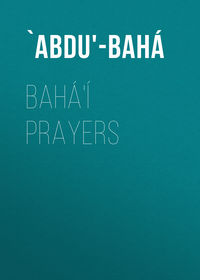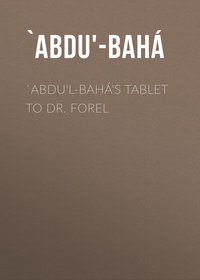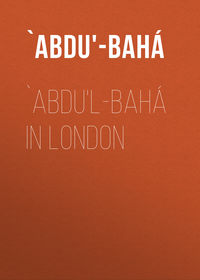 полная версия
полная версияFoundations of World Unity
Although the body politic is one family yet because of lack of harmonious relations some members are comfortable and some in direst misery, some members are satisfied and some are hungry, some members are clothed in most costly garments and some families are in need of food and shelter. Why? Because this family lacks the necessary reciprocity and symmetry. This household is not well arranged. This household is not living under a perfect law. All the laws which are legislated do not ensure happiness. They do not provide comfort. Therefore a law must be given to this family by means of which all the members of this family will enjoy equal well-being and happiness.
Is it possible for one member of a family to be subjected to the utmost misery and to abject poverty and for the rest of the family to be comfortable? It is impossible unless those members of the family be senseless, atrophied, inhospitable, unkind. Then they would say, “Though these members do belong to our family—let them alone. Let us look after ourselves. Let them die. So long as I am comfortable, I am honored, I am happy—this my brother—let him die. If he be in misery let him remain in misery, so long as I am comfortable. If he is hungry let him remain so; I am satisfied. If he is without clothes, so long as I am clothed, let him remain as he is. If he is shelterless, homeless, so long as I have a home, let him remain in the wilderness.”
Such utter indifference in the human family is due to lack of control, to lack of a working law, to lack of kindness in its midst. If kindness had been shown to the members of this family surely all the members thereof would have enjoyed comfort and happiness.
His Holiness Bahá’u’lláh has given instructions regarding every one of the questions confronting humanity. He has given teachings and instructions with regard to every one of the problems with which man struggles. Among them are (the teachings) concerning the question of economics that all the members of the body politic may enjoy through the working out of this solution the greatest happiness, welfare and comfort without any harm or injury attacking the general order of things. Thereby no difference or dissension will occur. No sedition or contention will take place. This solution is this:
First and foremost is the principle that to all the members of the body politic shall be given the greatest achievements of the world of humanity. Each one shall have the utmost welfare and well-being. To solve this problem we must begin with the farmer; there will we lay a foundation for system and order because the peasant class and the agricultural class exceed other classes in the importance of their service. In every village there must be established a general storehouse which will have a number of revenues.
The first revenue will be that of the tenth or tithes.
The second revenue (will be derived) from the animals. The third revenue, from the minerals, that is to say, every mine prospected or discovered, a third thereof will go to this vast storehouse.
The fourth is this: whosoever dies without leaving any heirs all his heritage will go to the general storehouse.
Fifth, if any treasures shall be found on the land they should be devoted to this storehouse.
All these revenues will be assembled in this storehouse.
As to the first, the tenths or tithes: we will consider a farmer, one of the peasants. We will look into his income. We will find out, for instance, what is his annual revenue and also what are his expenditures. Now, if his income be equal to his expenditures, from such a farmer nothing whatever will be taken. That is, he will not be subjected to taxation of any sort, needing as he does all his income. Another farmer may have expenses running up to one thousand dollars we will say, and his income is two thousand dollars. From such an one a tenth will be required, because he has a surplus. But if his income be ten thousand dollars and his expenses one thousand dollars or his income twenty thousand dollars, he will have to pay as taxes, one-fourth. If his income be one hundred thousand dollars and his expenses five thousand, one-third will he have to pay because he has still a surplus since his expenses are five thousand and his income one hundred thousand. If he pays, say, thirty-five thousand dollars, in addition to the expenditure of five thousand he still has sixty thousand left. But if his expenses be ten thousand and his income two hundred thousand then he must give an even half because ninety thousand will be in that case the sum remaining. Such a scale as this will determine allotment of taxes. All the income from such revenues will go to this general storehouse.
Then there must be considered such emergencies as follows: a certain farmer whose expenses run up to ten thousand dollars and whose income is only five thousand, he will receive necessary expenses from the storehouse. Five thousand dollars will be allotted to him so he will not be in need.
Then the orphans will be looked after, all of whose expenses will be taken care of. The cripples in the village—all their expenses will be looked after. The poor in the village—their necessary expenses will be defrayed. And other members who for valid reasons are incapacitated—the blind, the old, the deaf—their comfort must be looked after. In the village no one will remain in need or in want. All will live in the utmost comfort and welfare. Yet no schism will assail the general order of the body politic.
Hence the expenses or expenditures of the general storehouse are now made clear and its activities made manifest. The income of this general storehouse has been shown. Certain trustees will be elected by the people in a given village to look after these transactions. The farmers will be taken care of and if after all these expenses are defrayed any surplus is found in the storehouse it must be transferred to the national treasury.
This system is all thus ordered so that in the village the very poor will be comfortable, the orphans will live happily and well; in a word, no one will be left destitute. All the individual members of the body politic will thus live comfortably and well.
For larger cities, naturally, there will be a system on a larger scale. Were I to go into that solution the details thereof would be very lengthy.
The result of this (system) will be that each individual member of the body politic will live most comfortably and happily under obligation to no one. Nevertheless, there will be preservation of degree because in the world of humanity there must needs be degrees. The body politic may well be likened to an army. In this army there must be a general, there must be a sergeant, there must be a marshal, there must be the infantry; but all must enjoy the greatest comfort and welfare.
God is not partial and is no respecter of persons. He has made provision for all. The harvest comes forth for everyone. The rain showers upon everybody and the heat of the sun is destined to warm everyone. The verdure of the earth is for everyone. Therefore there should be for all humanity the utmost happiness, the utmost comfort, the utmost well-being.
But if conditions are such that some are happy and comfortable and some in misery; some are accumulating exorbitant wealth and others are in dire want—under such a system it is impossible for man to be happy and impossible for him to win the good pleasure of God. God is kind to all. The good pleasure of God consists in the welfare of all the individual members of mankind.
A Persian king was one night in his palace, living in the greatest luxury and comfort. Through excessive joy and gladness he addressed a certain man, saying: “Of all my life this is the happiest moment. Praise be to God, from every point prosperity appears and fortune smiles! My treasury is full and the army is well taken care of. My palaces are many; my land unlimited; my family is well off; my honor and sovereignty are great. What more could I want!”
The poor man at the gate of his palace spoke out, saying: “O kind king! Assuming that you are from every point of view so happy, free from every worry and sadness—do you not worry for us? You say that on your own account you have no worries—but do you never worry about the poor in your land? Is it becoming or meet that you should be so well off and we in such dire want and need? In view of our needs and troubles how can you rest in your palace, how can you even say that you are free from worries and sorrows? As a ruler you must not be so egoistic as to think of yourself alone but you must think of those who are your subjects. When we are comfortable then you will be comfortable; when we are in misery how can you, as a king, be in happiness?”
The purport is this that we are all inhabiting one globe of earth. In reality we are one family and each one of us is a member of this family. We must all be in the greatest happiness and comfort, under a just rule and regulation which is according to the good pleasure of God, thus causing us to be happy, for this life is fleeting.
If man were to care for himself only he would be nothing but an animal for only the animals are thus egoistic. If you bring a thousand sheep to a well to kill nine hundred and ninety-nine the one remaining sheep would go on grazing, not thinking of the others and worrying not at all about the lost, never bothering that its own kind had passed away, or had perished or been killed. To look after one’s self only is therefore an animal propensity. It is the animal propensity to live solitary and alone. It is the animal proclivity to look after one’s own comfort. But man was created to be a man—to be fair, to be just, to be merciful, to be kind to all his species, never to be willing that he himself be well off while others are in misery and distress—this is an attribute of the animal and not of man. Nay, rather, man should be willing to accept hardships for himself in order that others may enjoy wealth; he should enjoy trouble for himself that others may enjoy happiness and well-being. This is the attribute of man. This is becoming of man. Otherwise man is not man—he is less than the animal.
The man who thinks only of himself and is thoughtless of others is undoubtedly inferior to the animal because the animal is not possessed of the reasoning faculty. The animal is excused; but in man there is reason, the faculty of justice, the faculty of mercifulness. Possessing all these faculties he must not leave them unused. He who is so hard-hearted as to think only of his own comfort, such an one will not be called man.
Man is he who forgets his own interests for the sake of others. His own comfort he forfeits for the well-being of all. Nay, rather, his own life must he be willing to forfeit for the life of mankind. Such a man is the honor of the world of humanity. Such a man is the glory of the world of mankind. Such a man is the one who wins eternal bliss. Such a man is near to the threshold of God. Such a man is the very manifestation of eternal happiness. Otherwise, men are like animals, exhibiting the same proclivities and propensities as the world of animals. What distinction is there? What prerogatives, what perfections? None whatever! Animals are better even—thinking only of themselves and negligent of the needs of others.
Consider how the greatest men in the world—whether among prophets or philosophers—all have forfeited their own comfort, have sacrificed their own pleasure for the well-being of humanity. They have sacrificed their own lives for the body politic. They have sacrificed their own wealth for that of the general welfare. They have forfeited their own honor for the honor of mankind. Therefore it becomes evident that this is the highest attainment for the world of humanity.
We ask God to endow human souls with justice so that they may be fair, and may strive to provide for the comfort of all, that each member of humanity may pass his life in the utmost comfort and welfare. Then this material world will become the very paradise of the Kingdom, this elemental earth will be in a heavenly state and all the servants of God will live in the utmost joy, happiness and gladness. We must all strive and concentrate all our thoughts in order that such happiness may accrue to the world of humanity.
“The question of socialization is very important. It will not be…”
The question of socialization is very important. It will not be solved by strikes for wages. All the governments of the world must be united and organize an assembly the members of which should be elected from the parliaments and the nobles of the nations. These must plan with utmost wisdom and power so that neither the capitalist suffer from enormous losses nor the laborers become needy. In the utmost moderation they should make the law; then announce to the public that the rights of the working people are to be strongly preserved. Also the rights of the capitalists are to be protected. When such a general plan is adopted by the will of both sides, should a strike occur, all the governments of the world collectively should resist it. Otherwise, the labor problem will lead to much destruction, especially in Europe. Terrible things will take place.
For instance, the owners of properties, mines and factories should share their incomes with their employees and give a fairly certain percentage of their products to their workingmen in order that the employees may receive, beside their wages, some of the general income of the factory so that the employee may strive with his soul in the work.
No more trusts will remain in the future. The question of the trusts will be wiped away entirely. Also, every factory that has ten thousand shares will give two thousand shares of these ten thousand to its employees and will write the shares in their names, so that they may have them, and the rest will belong to the capitalists. Then at the end of the month or year whatever they may earn after the expenses and wages are paid, according to the number of shares, should be divided among both. In reality, so far great injustice has befallen the common people. Laws must be made because it is impossible for the laborers to be satisfied with the present system. They will strike every month and every year. Finally, the capitalists will lose. In ancient times a strike occurred among the Turkish soldiers. They said to the government: “Our wages are very small and they should be increased.” The government was forced to give them their demands. Shortly afterwards they struck again. Finally all the incomes went to the pockets of the soldiers to the extent that they killed the king, saying: “Why didst thou not increase the income so that we might have received more?”
It is impossible for a country to live properly without laws. To solve this problem rigorous laws must be made, so that all the governments of the world will be the protectors thereof.
In the Bolshevistic principles equality is effected through force. The masses who are opposed to the people of rank and to the wealthy class desire to partake of their advantages.
But in the divine teachings equality is brought about through a ready willingness to share. It is commanded as regards wealth that the rich among the people, and the aristocrats should, by their own free will and for the sake of their own happiness, concern themselves with and care for the poor. This equality is the result of the lofty characteristics and noble attributes of mankind.
THE CRITERIONS OF TRUTH
During my visit to London and Paris last year7 I had many talks with the materialistic philosophers of Europe. The basis of all their conclusions is that the acquisition of knowledge of phenomena is according to a fixed, invariable law,—a law mathematically exact in its operation through the senses. For instance, the eye sees a chair; therefore there is no doubt of the chair’s existence. The eye looks up into the heavens and beholds the sun; I see flowers upon this table; I smell their fragrance; I hear sounds outside, etc., etc. This, they say, is a fixed mathematical law of perception and deduction, the operation of which admits of no doubt whatever; for inasmuch as the universe is subject to our sensing, the proof is self-evident that our knowledge of it must be gained through the avenues of the senses. That is to say, the materialists announce that the criterion and standard of human knowledge is sense perception. Among the Greeks and Romans the criterion of knowledge was reason; that whatever is provable and acceptable by reason must necessarily be admitted as true. A third standard or criterion is the opinion held by theologians that traditions or prophetic statement and interpretations constitute the basis of human knowing. There is still another, a fourth criterion upheld by religionists and metaphysicians who say that the source and channel of all human penetration into the unknown is through inspiration. Briefly then, these four criterions according to the declarations of men are: First—Sense Perception; Second—Reason; Third—Traditions; Fourth—Inspiration.
In Europe I told the philosophers and scientists of materialism that the criterion of the senses is not reliable. For instance, consider a mirror and the images reflected in it. These images have no actual corporeal existence. Yet if you had never seen a mirror you would firmly insist and believe that they were real. The eye sees a mirage upon the desert as a lake of water but there is no reality in it. As we stand upon the deck of a steamer the shore appears to be moving, yet we know the land is stationary and we are moving. The earth was believed to be fixed and the sun revolving about it but although this appears to be so, the reverse is now known to be true. A whirling torch makes a circle of fire appear before the eye, yet we realize there is but one point of light. We behold a shadow moving upon the ground but it has no material existence, no substance. In deserts the atmospheric effects are particularly productive of illusions which deceive the eye. Once I saw a mirage in which a whole caravan appeared traveling upward into the sky. In the far north other deceptive phenomena appear and baffle human vision. Sometimes three or four suns called by scientists “mock suns” will be shining at the same time whereas we know the great solar orb is one and that it remains fixed and single. In brief, the senses are continually deceived and we are unable to separate that which is reality from that which is not.
As to the second criterion—reason—this likewise is unreliable and not to be depended upon. This human world is an ocean of varying opinions. If reason is the perfect standard and criterion of knowledge, why are opinions at variance and why do philosophers disagree so completely with each other? This is a clear proof that human reason is not to be relied upon as an infallible criterion. For instance, great discoveries and announcements of former centuries are continually upset and discarded by the wise men of today. Mathematicians, astronomers, chemical scientists continually disprove and reject the conclusions of the ancients; nothing is fixed, nothing final; everything continually changing because human reason is progressing along new roads of investigation and arriving at new conclusions every day. In the future much that is announced and accepted as true now will be rejected and disproved. And so it will continue ad infinitum.
When we consider the third criterion—traditions—upheld by theologians as the avenue and standard of knowledge, we find this source equally unreliable and unworthy of dependence. For religious traditions are the report and record of understanding and interpretation of the Book. By what means has this understanding, this interpretation been reached? By the analysis of human reason. When we read the Book of God the faculty of comprehension by which we form conclusions is reason. Reason is mind. If we are not endowed with perfect reason, how can we comprehend the meanings of the Word of God? Therefore human reason, as already pointed out, is by its very nature finite and faulty in conclusions. It cannot surround the Reality Itself, the Infinite Word. Inasmuch as the source of traditions and interpretations is human reason, and human reason is faulty, how can we depend upon its findings for real knowledge?
The fourth criterion I have named is inspiration through which it is claimed the reality of knowledge is attainable. What is inspiration? It is the influx of the human heart. But what are satanic promptings which afflict mankind? They are the influx of the heart also. How shall we differentiate between them? The question arises, How shall we know whether we are following inspiration from God or satanic promptings of the human soul? Briefly, the point is that in the human material world of phenomena these four are the only existing criterions or avenues of knowledge, and all of them are faulty and unreliable. What then remains? How shall we attain the reality of knowledge? By the breaths and promptings of the Holy Spirit which is light and knowledge itself. Through it the human mind is quickened and fortified into true conclusions and perfect knowledge. This is conclusive argument showing that all available human criterions are erroneous and defective, but the divine standard of knowledge is infallible. Therefore man is not justified in saying “I know because I perceive through my senses”; or “I know because it is proved through my faculty of reason”; or “I know because it is according to tradition and interpretation of the holy book”; or “I know because I am inspired.” All human standard of judgment is faulty, finite.
MAN AND NATURE
If we look with a perceiving eye upon the world of creation, we find that all existing things may be classified as follows: First—Mineral—that is to say matter or substance appearing in various forms of composition. Second—Vegetable—possessing the virtues of the mineral plus the power of augmentation or growth, indicating a degree higher and more specialized than the mineral. Third—Animal—possessing the attributes of the mineral and vegetable plus the power of sense perception. Fourth—Human—the highest specialized organism of visible creation, embodying the qualities of the mineral, vegetable and animal plus an ideal endowment absolutely minus and absent in the lower kingdoms—the power of intellectual investigation into the mysteries of outer phenomena. The outcome of this intellectual endowment is science which is especially characteristic of man. This scientific power investigates and apprehends created objects and the laws surrounding them. It is the discoverer of the hidden and mysterious secrets of the material universe and is peculiar to man alone. The most noble and praiseworthy accomplishment of man therefore is scientific knowledge and attainment.
Science may be likened to a mirror wherein the images of the mysteries of outer phenomena are reflected. It brings forth and exhibits to us in the arena of knowledge all the product of the past. It links together past and present. The philosophical conclusions of bygone centuries, the teachings of the prophets and wisdom of former sages are crystallized and reproduced in the scientific advancement of today. Science is the discoverer of the past. From its premises of past and present we deduce conclusions as to the future. Science is the governor of nature and its mysteries, the one agency by which man explores the institutions of material creation. All created things are captives of nature and subject to its laws. They cannot transgress the control of these laws in one detail or particular. The infinite starry worlds and heavenly bodies are nature’s obedient subjects. The earth and its myriad organisms, all minerals, plants and animals are thralls of its dominion. But man through the exercise of his scientific, intellectual power can rise out of this condition, can modify, change and control nature according to his own wishes and uses. Science, so to speak, is the “breaker” of the laws of nature.
Consider, for example, that man according to natural law should dwell upon the surface of the earth. By overcoming this law and restriction however he sails in ships over the ocean, mounts to the zenith in aeroplanes and sinks to the depths of the sea in submarines. This is against the fiat of nature and a violation of her sovereignty and dominion. Nature’s laws and methods, the hidden secrets and mysteries of the universe, human inventions and discoveries, all our scientific acquisitions should naturally remain concealed and unknown, but man through his intellectual acumen searches them out of the plane of the invisible, draws them into the plane of the visible, exposes and explains them. For instance, one of the mysteries of nature is electricity. According to nature this force, this energy should remain latent and hidden, but man scientifically breaks through the very laws of nature, arrests it and even imprisons it for his use.


